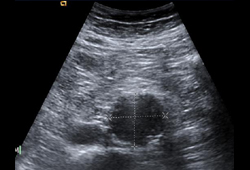Summary
Definition
History and exam
Key diagnostic factors
- რისკფაქტორების არსებობა
- პალპირებადი მოპულსირე წარმონაქმნები მუცლის ღრუში.
Other diagnostic factors
- მუცლის, ზურგის ან საზარდულის ტკივილი
- ჰიპოტენზია
Risk factors
- თამბაქოს მოხმარება
- მემკვიდრული / ოჯახური ანამნეზი
- მომატებული ასაკი
- მამრობითი სქესი (პრევალენტობა)
- მდედრობითი სქესი (რუპტურა)
- თანდაყოლილი / შემაერთებელი ქსოვილის პათოლოგია
- ჰიპერლიპიდემია
- ფქოდ - ფილტვის ქრონიკული ობსტრუქციული დაავადება
- ათეროსკლეროზი (იგივე კორონარული არტერიების დაავადება (CAD), პერიფერიული არტერიების ოკლუზიური დაავადება)
- ჰიპერტენზია
- აბდომინური (ცენტრალური) სიმსუქნე
- არადიაბეტური
- ევროპული წარმომავლობა
- ფთორქინოლონების კლასის ანტიბიოტიკები
- ანევრიზმები სხეულის სხვა ადგილებში
Diagnostic tests
1st tests to order
- მუცლის ღრუს ულტრაბგერითი გამოკვლევა
Tests to consider
- ერითროციტების დალექვის სიჩქარე (ESR) / C- რეაქტიული ცილა (CRP)
- FBC
- სისხლის კულტურები
- კომპიუტერული ტომოგრაფიული ანგიოგრაფია (CTA)/CT
- მაგნიტურ-რეზონანსული ანგიოგრაფია (MRA)/MRI
Treatment algorithm
გამსკდარი მუცლის აორტის ანევრიზმა (AAA)
სიმპტომური, მაგრამ არა გამსკდარი მუცლის აორტის ანევრიზმი
შემთხვევითი აღმოჩენა: მცირე ზომის მუცლის აორტის ანევრიზმა
შემთხვევითი აღმოჩენა: მუცლის აორტის დიდი ზომის ანევრიზმა
ენდოვასკულური ჩარევის შემდგომი გაჟონვა, რომელსაც ესაჭიროება მკურნალობა
Contributors
Authors
Matt J. Bown, MB BCh, MD, FRCS, PGCert (Bioinformatics)
Professor of Vascular Surgery
Department of Cardiovascular Sciences
University of Leicester, Leicester Royal Infirmary
Leicester
UK
Disclosures
MJB has grant funding from the British Heart Foundation and the National Institute for Health Research.
Andrew Duncan, MBBS, BSc, MRCS
Honorary Research Fellow
Department of Cardiovascular Sciences
University of Leicester
Leicester
UK
Disclosures
AD declares that he has no competing interests.
Acknowledgements
Professor Matt Bown and Mr Andrew Duncan would like to gratefully acknowledge Dr Maureen K. Sheehan, Dr Dawn M. Barnes, and Dr Gilbert R. Upchurch, previous contributors to this topic.
Disclosures
MKS, DMB, and GRU declare that they have no competing interests.
Peer reviewers
Ross Naylor, MBBS
Professor of Vascular Surgery
Vascular Surgery Group
Division of Cardiovascular Sciences
Leicester Royal Infirmary
UK
Disclosures
RN declares that he has no competing interests.
William Pearce, MD
Chief of Division of Vascular Surgery
Department of Surgery
Northwestern Memorial Hospital
Chicago
IL
Disclosures
WP declares that he has no competing interests.
Peer reviewer acknowledgements
BMJ Best Practice topics are updated on a rolling basis in line with developments in evidence and guidance. The peer reviewers listed here have reviewed the content at least once during the history of the topic.
Disclosures
Peer reviewer affiliations and disclosures pertain to the time of the review.
References
Key articles
Owens DK, Davidson KW, Krist AH, et al; US Preventive Services Task Force. Screening for abdominal aortic aneurysm: US Preventive Services Task Force recommendation statement. JAMA. 2019 Dec 10;322(22):2211-8.Full text Abstract
Isselbacher EM, Preventza O, Hamilton Black J 3rd, et al. 2022 ACC/AHA guideline for the diagnosis and management of aortic disease: a report of the American Heart Association/American College of Cardiology Joint Committee on Clinical Practice Guidelines. Circulation. 2022 Dec 13;146(24):e334-e482.Full text Abstract
Wanhainen A, Verzini F, Van Herzeele I, et al. Editor's choice - European Society for Vascular Surgery (ESVS) 2019 clinical practice guidelines on the management of abdominal aorto-iliac artery aneurysms. Eur J Vasc Endovasc Surg. 2019 Jan;57(1):8-93.Full text Abstract
Chaikof EL, Dalman RL, Eskandari MK, et al. The Society for Vascular Surgery practice guidelines on the care of patients with an abdominal aortic aneurysm. J Vasc Surg. 2018 Jan;67(1):2-77.e2.Full text Abstract
Reference articles
A full list of sources referenced in this topic is available to users with access to all of BMJ Best Practice.
Use of this content is subject to our disclaimer

